Resilient Futures
System Dynamics, Tech Innovations, and Climate Resilience
2025, Pages 113-134
This chapter ties into Sustainable Development Goal 13: Climate Action by focusing on the assessment and quantification of resilience to manage climate change risks and enhance adaptive capacity. By exploring methodologies, models, and real-world case studies, it provides valuable insights for stakeholders to effectively incorporate resilience metrics and climate change effects into research and policy.
"Racial, Ethnic, and Socioeconomic Differences in Critical Care Near the End of Life
Hauschildt, Katrina E. et al.
Critical Care Clinics, Volume 40, Issue 4, 753 - 766"
Patients from groups that are racially or ethnically minoritized or of low socioeconomic status receive more intensive care near the end of life than others, in part, due to their higher propensity to be admitted to high treatment-intensity hospitals.
Disparities in health and health care exist across multiple dimensions. Greater recognition and understanding of the social determinants of health has led to a considerable amount of research on the ways racism affects health outcomes, socioeconomic status, insurance status, the physical environment, and more.
Compelling evidence shows that social risks and mental health are intertwined.
The etiology of pediatric obesity is complex and multifactorial.
Each year the RELX Environmental Challenge is awarded to projects that best demonstrate how they can provide sustainable access to safe water or sanitation. There is a $50,000 prize for the first place entry and a $25,000 prize for the second place entry. The winners also receive free access for one year to ScienceDirect, our Scientific, Technical & Medical business’ database of full text, scientific information. Projects must have clear practical applicability, address identified need and advance related issues such as health, education, or human rights.
United Nations Day 2026: Promoting Peace, Unity, and Global Partnerships
Celebrated annually on October 24, United Nations Day commemorates the establishment of the United Nations in 1945. This day is devoted to promoting global unity, international cooperation, and the organization's work in advancing peace, human rights, and sustainable development. Officially declared by the United Nations General Assembly in 1947, the observance was later recognized as an international holiday in 1971, encouraging all member states to honor it as a public holiday.
The Climate Energy Nexus: Understanding the Relationship between Energy Production Systems and Climate Trends
2025, Pages 1-22
This chapter notably supports SDGs 7 (Affordable and Clean Energy), 12 (Responsible Consumption), and 13 (Climate Action) by helping readers to understand the interactions between energy consumption, emissions, and climate, and by introducing modeling approaches.



